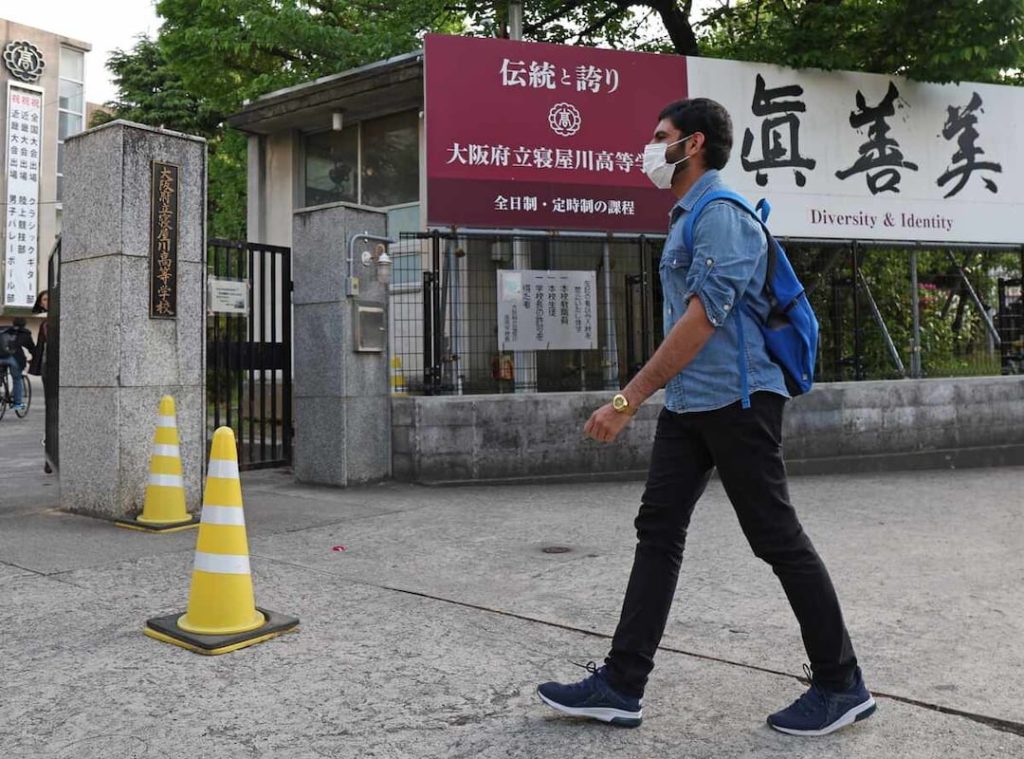
Afzal attends school after finishing work. Neyagawa City, Osaka Prefecture. (©Sankei by Koji Taito)
このページを 日本語 で読む
Afzal, a 24-year-old from Pakistan, is enrolled in a part-time program at Neyagawa High School in Osaka. Now in his fourth and final year, he is set to graduate in the spring of 2026.
"If I understand Japanese, I can talk with more people. That's why I want to keep studying," he says. The motivation that first sparked during his time in night school still drives him today.
Afzal came to Japan eight years ago and enrolled at Satsuki Gakuen Night School in Moriguchi City, Osaka Prefecture, before moving on to high school.
High School Learning
Every day, he heads to school after finishing work. In early May, he greeted teachers at the school gate and walked to his first-period Information Technology class.
At night school, he started with the basics — hiragana and katakana — using materials with furigana (pronunciation guides) alongside kanji. High school textbooks don't include these aids, so he often finds kanji and new vocabulary challenging.
He listens closely to make sure he doesn't miss a word. His serious, focused expression hasn't changed since he was first interviewed by The Sankei Shimbun in 2019.
"Classes are harder than at night school. I really have to study," he says.
His homeroom teacher, Kohei Otera, is impressed. "He's hardworking, and it's truly remarkable how he stays focused without being swayed by others."

Family and Early Life in Pakistan
The eldest of three brothers, Afzal came to Japan in March 2017 with his middle brother. They moved in with their father, who runs a car-related business in Obama City, Fukui Prefecture. However, no local school would accept Afzal, as he was already past the standard school age.
Back in Pakistan, he had rarely attended school. Ongoing conflict made his area dangerous, and even getting to class involved serious risks. He was also afraid of teachers, who sometimes used violence.
Determined to give his sons an education, their father supported their move to Osaka. In April 2018, Afzal and his brother enrolled at Satsuki Gakuen Night School and began living apart from him.
Passion for Education
In a writing assignment at night school, Afzal reflected: "Not being able to read, write, or speak [Japanese] is really tough. I came to understand how important studying is. I saw people older than me working hard every day, and it motivated me too."
He adds, "Once I started understanding Japanese, I could talk with teachers and friends. That made me want to learn even more."
Afzal spent four years at night school, and his brother stayed for five. Both eventually entered the part-time program at Neyagawa High School. In September 2024, their youngest brother, now 16, also came to Japan and enrolled at Satsuki Gakuen.

Balancing School, Work, and Family
Afzal's middle brother left high school at the end of 2024 to help with their father's business in Obama City. Now, Afzal juggles school, work, and supporting his youngest brother, who is still learning Japanese.
In early May, he returned to visit his former night school. Years ago, he had written in an assignment, "I became a student council officer and was able to speak in front of everyone." Now, he shares advice with current students about studying and life in high school.
Classes at Neyagawa High's part-time program start at 6:05 PM. As Afzal waited for class to begin, two male students walked into the room and began chatting with him in Japanese. They're his classmates from the badminton club.
Extracurricular Activities
"I love badminton. Playing sports is always fun," he said with a smile.
Afzal discovered badminton after coming to Japan. While living in Obama, he and his brother attended a weekly class. After moving to Moriguchi, he kept playing during PE and at a local sports center. When he started high school, he officially joined the school's badminton club. Practices are short — just three times a week from 9:20 PM to around 10 PM — but his skill stands out.

"He has beautiful form and technique. Truly excellent badminton," says the club advisor. At the 2024 Osaka-wide tournament for part-time and correspondence high school students, the final match was between the two brothers. Afzal, showing the pride of an older sibling, won the championship. The next tournament is just around the corner.
With less than a year left until graduation, Afzal is still unsure about what comes next. His time studying in Japan has opened up new possibilities.
"I still want to study," he says softly, his voice revealing some hesitation about entering the workforce. For now, how he'll use what he's learned in night school and high school remains to be seen.
RELATED:
- Happy Haiku Day! How a Kiwi Fell in Love with the 5-7-5 as a Medium of Storytelling
- Moshi Moshi: Speaking Native Japanese Has Its Positives and Pitfalls
- OECD Survey: Finland, Japan Top Global Standing in Adult Competency
- Students from India Explore School Life in Nara
Author: The Sankei Shimbun
このページを 日本語 で読む








